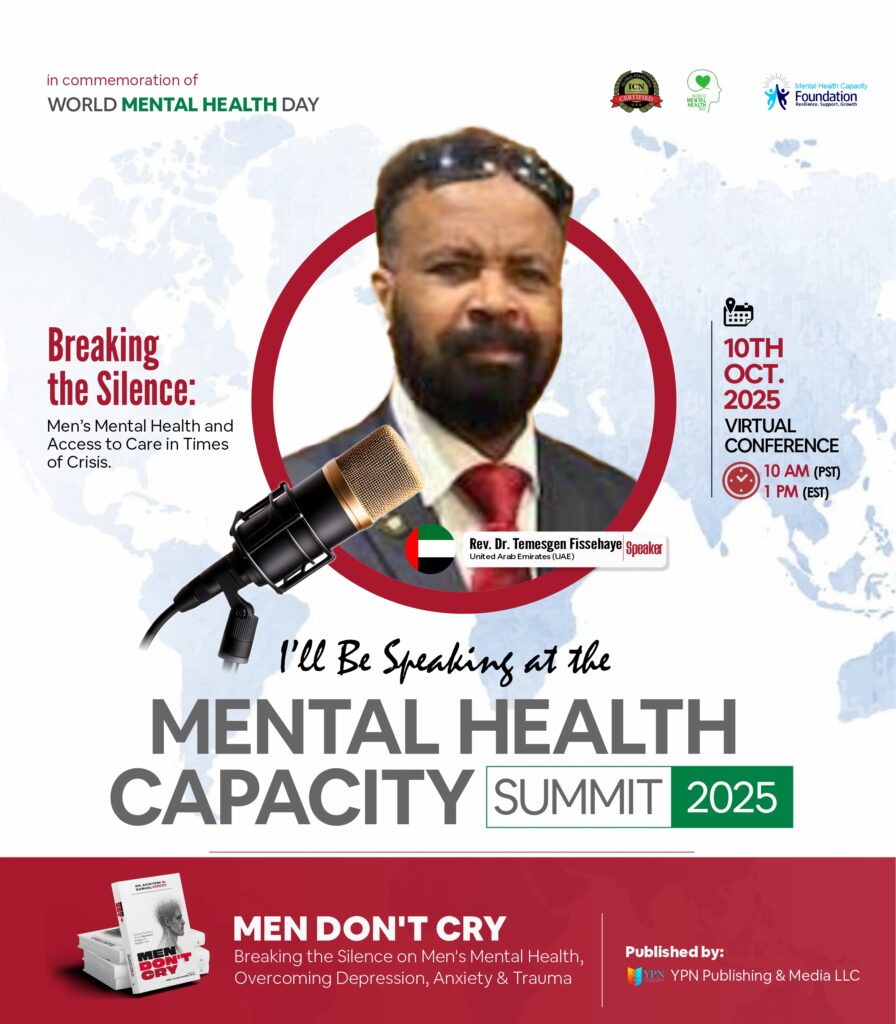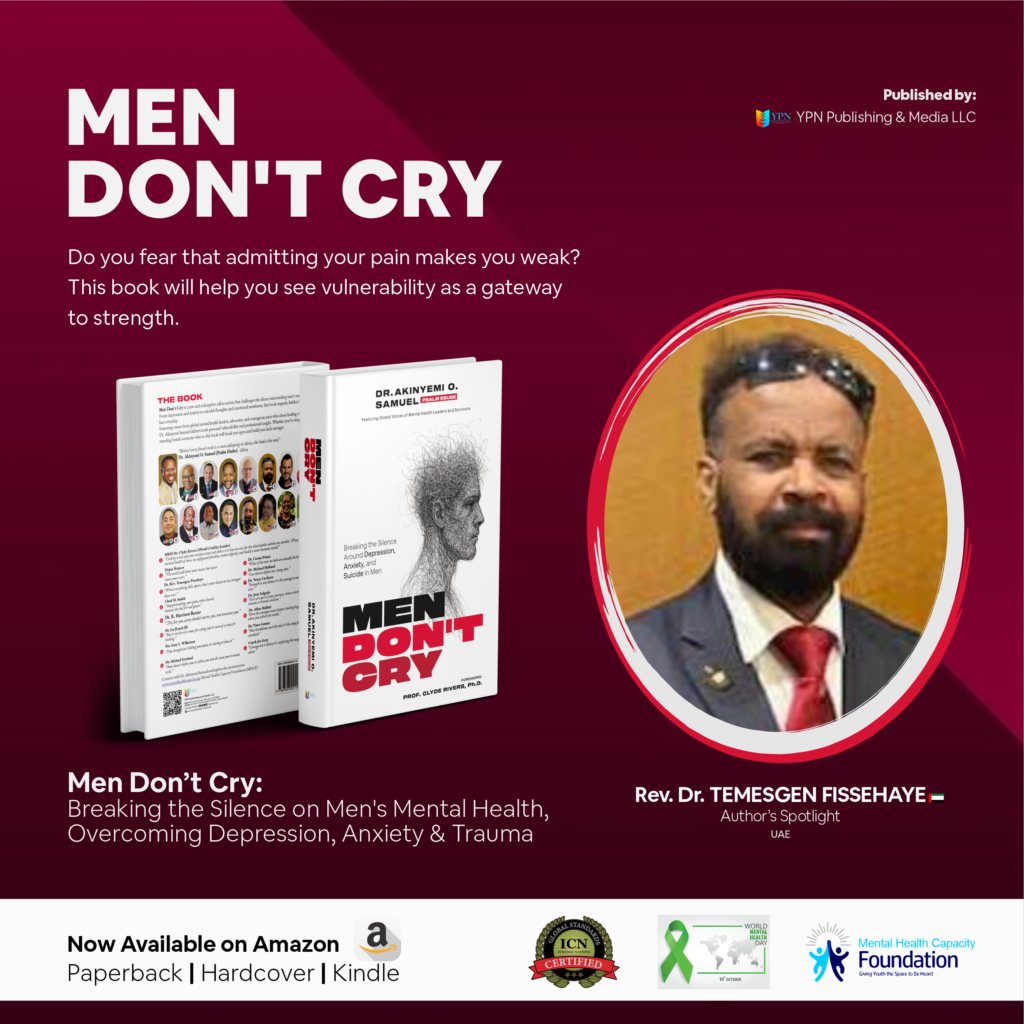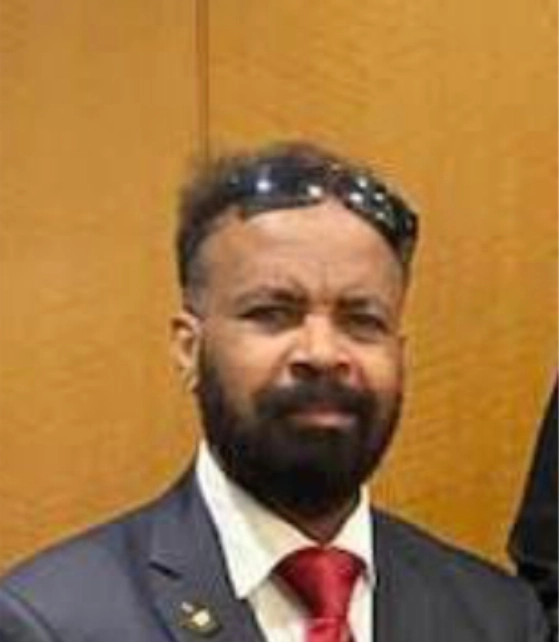Sheridan, USA October 04, 2025 Innovation Times Senior Correspondent
When everything falls apart, that is often the very moment a man’s greatest strength is revealed. Rev. Dr. Temesgen Fissehaye, in his profound chapter “Crushed but Not Broken,” brings this truth to life with moving honesty and spiritual depth. His message is clear: while pain is inevitable, brokenness is not a permanent sentence. The chapter, part of the groundbreaking book Men Don’t Cry, is already being recognized as a life-changing contribution to the global conversation on men’s mental health.
In anticipation of World Mental Health Day on October 10, this work carries a powerful relevance. This year’s theme, Breaking the Silence: Men’s Mental Health and Access to Care in Times of Crisis, aligns perfectly with Dr. Fissehaye’s call for men to rise above cultural silence and reclaim their voices. As the author prepares to speak during the commemorative summit, his chapter provides the world with a guide for resilience.
“Crushed but Not Broken” begins with a truth many men have lived but few dare to say aloud: the crushing weight of life is real. Dr. Fissehaye recounts seasons of hardship when the pressure of responsibility, expectation, and hidden pain threatened to suffocate hope. Yet instead of yielding to despair, he frames these seasons as defining moments. The crushing, he argues, is not meant to destroy but to refine, much like olives pressed to produce oil.
This perspective is not theoretical. Dr. Fissehaye speaks as both a minister and a man who has counseled countless others in their darkest nights. From the boardrooms of leaders to the pews of pastors, from soldiers in uniform to fathers struggling in silence, he has witnessed firsthand how men often bury their pain beneath a mask of strength. His words strip away that façade and remind readers that true strength lies in the courage to admit struggle and still rise.
The chapter draws deeply from faith and scripture, grounding men in the promise that being pressed does not equate to being destroyed. Referencing 2 Corinthians 4:8-9, he emphasizes that while men may be hard pressed on every side, they are not abandoned. This message is not only spiritual but deeply practical, urging men to embrace vulnerability as a path to healing.
One of the most compelling aspects of this chapter is its universality. Dr. Fissehaye does not write only to men of faith but to every man who has ever felt the weight of rejection, failure, or loss. He reminds readers that pain does not discriminate. Businessmen, students, ministers, and fathers alike all carry invisible battles. By naming these realities, he dismantles stigma and makes space for men to seek help without shame.
The chapter’s brilliance lies in its ability to connect the crushing of life to the release of destiny. Just as oil flows from olives only when they are pressed, so too can men discover their true purpose in seasons of difficulty. This reframing transforms suffering from something to be hidden into a catalyst for growth and healing.

World Mental Health Day provides the perfect platform for such a message. Men across the world are facing rising levels of depression, anxiety, and crisis. Yet statistics consistently show that men are less likely to seek help. Cultural norms that equate masculinity with silence perpetuate cycles of despair. “Crushed but Not Broken” directly confronts this lie, urging men to break the silence and access care without fear.
Dr. Fissehaye’s chapter also speaks to the global church, reminding spiritual leaders to become safe spaces for men. Too often, pulpits emphasize resilience while neglecting vulnerability. This chapter strikes a balance by affirming that tears, struggle, and even moments of collapse are not signs of weakness but stepping stones to wholeness.
The stories interwoven in the chapter bring the message to life. Men who once contemplated suicide went on to lead others. Fathers shattered by divorce became advocates for children. Individuals crushed by financial ruin discovered resilience to rebuild. These testimonies illustrate the transformative power of not yielding to brokenness.
Reading “Crushed but Not Broken” is more than engaging with words on a page; it is an invitation to a personal encounter with hope. It reminds readers that although pain may bruise the body and weigh on the mind, the spirit within can still rise. For many men who feel like life has dealt them its final blow, this chapter will be a lifeline.
What makes the book Men Don’t Cry remarkable is its collective honesty. Each chapter addresses unique dimensions of men’s struggles, but Dr. Fissehaye’s contribution stands out for its ability to blend spiritual wisdom, psychological insight, and cultural critique into one compelling message. His voice echoes the cry of millions of men while pointing them toward healing.
The timing of this message cannot be overstated. In times of crisis, from economic downturns to family pressures, men often internalize pain to avoid burdening others. This internalization, however, becomes a breeding ground for despair. By breaking silence, as Dr. Fissehaye urges, men not only save themselves but inspire others to seek help as well.
The chapter is not simply reflective; it is prescriptive. Readers walk away with both encouragement and practical takeaways. Dr. Fissehaye calls on men to seek community, to embrace vulnerability, and to trust that even in moments of crushing, they are not abandoned. These calls to action transform the reading experience into a catalyst for real-life change.
In recommending Men Don’t Cry to readers, it is not just about purchasing a book but about engaging in a movement. A movement that dismantles harmful stereotypes, uplifts silent voices, and opens the door to healing for countless men. “Crushed but Not Broken” is one of the clearest voices in that movement.
For anyone who has ever doubted their worth because of failure, for anyone who has felt crushed by rejection, and for anyone who has hidden pain for fear of judgment, this chapter provides a liberating truth: you may be crushed, but you are not broken. That distinction has the power to save lives.
As World Mental Health Day approaches, there could be no better investment than this book. It is a resource for fathers, brothers, pastors, professionals, and friends. It is a gift that says to men everywhere: you are not alone, and you are not beyond restoration.
“Crushed but Not Broken” is not only for men. It is for women who long to understand the silent battles of fathers, husbands, and sons. It is for leaders who want to equip themselves to better support the men they serve. Its universality makes it a tool for families, workplaces, and communities alike.
Dr. Fissehaye’s words also carry a timeless message of faith: that God has preserved greatness within every man. Even when crushed, that seed of greatness cannot be destroyed. For readers of faith, this assurance is deeply empowering. For others, it is an affirmation of human resilience.
The chapter’s imagery of pressing and release resonates across cultures. In many traditions, pressing olives, grapes, or seeds produces oil, wine, or life-giving essence. Dr. Fissehaye connects this universal imagery to the human experience, making his words both accessible and deeply meaningful.
As men prepare to gather globally on October 10, this chapter will serve as a cornerstone of the conversation. Its insights are timeless, but its urgency is for today. Men are in crisis, but they are not defeated. The crushing moments can lead to the greatest breakthroughs.

For readers eager to explore this transformative chapter, Men Don’t Cry is available in multiple formats. The Kindle edition can be accessed conveniently through Amazon Kindle. For those who prefer physical copies, the Paperback edition and Hardcover edition are also available.
Investing in this book is investing in change. It is choosing to believe that silence can be broken, that pain can be refined, and that men everywhere can rise again, even after being crushed.
In the end, Dr. Rev. Temesgen Fissehaye’s voice rings true: being crushed is not the end, and brokenness does not define you. It is in those very moments of pressure that resilience is born. This chapter, and indeed this book, will change lives and give men the courage to live whole again.
ABOUT THE AUTHOR
Dr. Rev. Temesgen Fesshaye is an evangelical pastor, educator, Christian minister, writer, and world-renowned leader. With a vision to raise leaders, help men discover greatness, and fulfill their divine purpose, he is committed to shaping world-class leaders for his generation. A leadership consultant with a strong focus on building structures, church planting, and mentoring, he has trained hundreds of people across Latin America, South America, North America, Central America, the Middle East, and Africa. Drawing on insights from top leadership experts in business and ministry, he has spoken to government leaders, presidents, kings, army personnel, and corporate audiences worldwide.
His influence spans both business and ministry, raising leaders who have gone on to accomplish remarkable feats. Recognized with awards such as the World Civility Global Ambassador Award powered by iChange Nations USA, he currently serves as a senior pastor in Dubai, continuing his mission to inspire, equip, and uplift leaders across the world.



